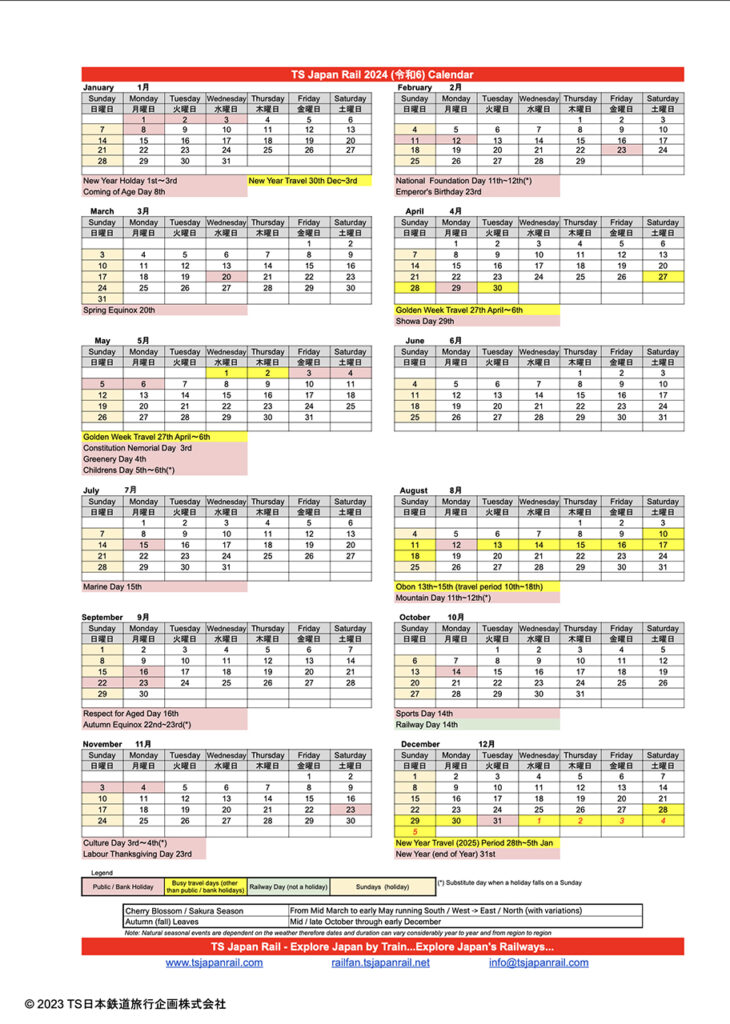In this article we introduce our 2024 Japan Calendar and also talk about what you need to know about Japan Holidays in General
Japan has numerous holidays, but for most the overseas visitor will not really notice. There are 3 however that you should be aware of when planning your trip. Find out more in the FAQ section below.
TS Japan Rail 2024 Japan Calendar

Our Japan Calendar shows all the Japan holidays and also the busy travel periods. You can download the calendar here:
Frequently Asked Questions about Japan Holidays
Does Public Transport Operate on Public Holidays?
Yes, public transport operates every day, including public holidays. In general, trains and buses follow a reduced holiday/weekend schedule. However, on long-distance rail lines such as the Shinkansen and highway buses, there may be additional services depending on the holiday and the day of the week it falls on. Additionally, tourist trains that usually operate on weekends may also operate on holidays.
If a holiday falls on a Monday, some long-distance trains may experience higher demand on Saturday mornings and Monday afternoons/evenings.
It’s important to note that during peak times like year-end / New Year, Golden Week (late April/early May), and Obon (mid-August), public transportation (and highways) will get particularly busy as many locals return to their hometowns or go on vacation.
Furthermore, it should be acknowledged that surrounding days before and after the actual holiday may also see increased activity if they fall in proximity to weekends.
Are shops, banks and tourist facilities open?
Most shops and tourist facilities are open on public holidays. However, banks are closed and in certain business areas, some shops may be closed as well. In general, overseas tourists won’t notice that it is a holiday except for some areas that might be more crowded. It’s important to note that New Year is an exception to this rule. During New Year’s holiday, most places will be closed from January 1st until January 3rd. Please refer to the information below for more details.
You mention that New Year, Golden Week and Obon are different?
Yes. these are major holidays when many locals travel back to their home towns or elsewhere on vacation. Conversely many of the big cities may be quieter during these holidays as their populations temporarily drop. Below we describe what to expect for each of these holidays:
__New Year (Holiday period: 28th Dec~3rd January)
During the period from the 28th of December to the 3rd of January, (but excluding the 1st of January), long distance trains (including Shinkansen), highway buses, and domestic flights will be very busy. It is advisable to book your tickets in advance.
On the 31st of December, most shops and restaurants will close early and remain closed on the 1st of January. Exception is, convenience stores (those open 24 hours) and also some supermarkets may open on New Year’s Day for limited hours. Public facilities and banks will be closed during this time but will reopen on the first business day after the 3rd of January. Please note that many bank and Post Office ATMs may also be unavailable.
Certain tourist facilities will remain open throughout this holiday period, but please check before hand as hours may be reduced.
Shops and restaurants that have been closed will gradually start reopening from the 2nd of January, with almost all being operational by the 4th or 5th.
Major shrines and temples, (and some smaller ones) will be bustling with people who come to pray for a prosperous year ahead. To accommodate these visitors, additional train services may be provided; however, local bus services might face disruptions due to street closures in proximity to these sites. We highly recommend visiting shrines and temples during this time for a unique Japanese experience.
__Golden Week (End April ~ First Week in May)
Golden Week occurs at the end of April and early May, spanning a period of seven days with four public holidays. During this time, many locals choose to take extended days off.
It is important to note that long-distance trains, including shinkansen, highway buses, and domestic flights will be busy. It is advisable to book seats in advance to secure your travel plans.
The majority of shops, public facilities, and tourist attractions will remain open during Golden Week. However, it is worth mentioning that popular tourist areas may be crowded due to the increased number of visitors.
__Obon (13th~15th August)
Obon is a Buddhist Religious festival where ancestral spirits are meant to visit earth. In Japan it is celebrated between 13th~15th August (*)
Although not a public holiday many people take holidays and many companies close down for the Obon period and many people will return to their home towns or take vacations.
Many people will also take the days surrounding Obon off as well.
Long distance trains (including shinkansen), highway buses and domestic flights will be busy, so like New Year and Golden week, you should try and reserve seats early.
Banks, public offices and most shops and all tourist facilities will remain open during Obon.
Some local rail and bus lines may operate a weekend or otherwise reduced schedule.
(*) although people and companies generally observe Obon during 13th and 15th August period, the actual religious ceremony is celebrated at different times around Japan. For example in Tokyo it is generally celebrated in July
What about Sakura (cherry blossom) and Autumn Leaves season?
These two periods can be very busy for travel, however as the dates are very dependent on the weather and also geography it is difficult to be certain when. For locals most Sakura or Autumn Leaves trips are spontaneous rather than booked long in advance. Many people will also enjoy in their local areas rather than travelling long distance, so local trains in popular areas can get very busy. Although in places some extra local trains may be put on, generally there will not be too many extra long distance trains or buses laid on.
Are Christmas and Easter big holidays in Japan?
Japan is not a christian country so not many people celebrate Christmas or Easter (in fact there are no public holidays for religious events).
For most people Christmas is a normal working day / school day. A lot of retail and tourist facilities do have Christmas decorations (although these come down promptly on 24th or 25th December in preparation for New Year). Some areas may have illuminations (which in many cases may just be coincidental with the fact that the end of year is coming up) and you will probably hear Christmas songs in shopping streets and stores.
The year end period is popular for Year End Parties (Bonenkai) and also for New Year Parties (Shin Nenkai) so restaurants can get busy.
Other busy times, Local Holidays?
There are no local holidays as such, but there are many local festivals, firework displays, other events etc. which may cause those local areas to be very busy. Often extra public transport services will be laid on, including some middle distance trains from surrounding areas. Local bus services may be altered or changed during these events.
And finally…
Although public holidays may mean some places are extra busy…they are also a good time to experience the real Japan, whether it is visiting shrines and temples at New Year or seeing some of the many traditional festivals and other events that take place during Golden Week and Obon…
TS Japan being a local expert can also give you tips on places to see sakura and autumn leaves that are not on the overseas tourist list…
We can also help you get off the “beaten track”, travel on some scenic routes and generally advise you how to travel at busy times!
Whether you want to See Japan by Rail or Explore Japan’s Railways, TS Japan Rail can help you plan your trip with ideas, designing travel itineraries, assisting with bookings and more.
We take the stress out of planning your trip and help ensure it is successful!

For more information on our services
see our homepage!









